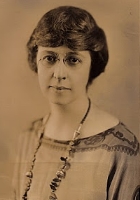Eunice Tietjens
Eunice Tietjens Poems
Beneath my window in a city street
A monster lairs, a creature huge and grim
And only half believed: the strength of him—
...
Space, and the twelve clean winds of heaven,
And this sharp exultation, like a cry, after the slow six thousand
steps of climbing!
This is Tai Shan, the beautiful, the most holy.
...
Beautiful and rich is an old friendship,
Grateful to the touch as ancient ivory,
Smooth as aged wine, or sheen of tapestry
...
The stone grows old.
Eternity is not for stones.
But I shall go down from this airy space, this swift white
peace, this stinging exultation;
...
Scherzo
COME, sprite, and dance! The sun is up,
The wind runs laughing down the sky
That brims with morning like a cup.
...
The tulips now are pushing up
Like small green knuckles through the ground.
The grass is young and doubtful yet,
...
The drug clerk stands behind the counter
Young and dapper and debonair….
Before him burn the great unwinking lights
...
CANNOT always feel his greatness.
Sometimes he walks beside me, step by step,
And paces slowly in the ways—
The simple, wingless ways
...
Eunice Tietjens Biography
Eunice Tietjens (July 29, 1884 - September 6, 1944) was an American poet, novelist, journalist, children's author, lecturer, and editor. Born as Eunice Strong Hammond in Chicago on July 29, 1884, she was educated in Europe and travelled heavily. She lived in Florida, New York, Japan, China, Tahiti and Tunisia, among other places. Tietjens was a World War I correspondent for the Chicago Daily News in France, 1917-1918. Her poems had already begun to be published in Poetry: A Magazine of Verse, the noted poetry magazine, around 1913. She later became publisher Harriet Monroe’s associate editor there for more than twenty-five years. Tietjens' was considered a more patient and generous editor, whose style contrasted sharply with that of Monroe, who was not known to treat would-be contributors with "kid gloves". One collection of stories, "Burton Holmes Travel Stories: Japan, Korea and Formosa" (1924) contains lively descriptions of East Asian countries. By contemporary standards, the stories seem provincial and quaintly Eurocentric. The stories contain descriptions of nationalities and ethnicities that can be understood to be racist. Here's an excerpt: "...For a great many years this island of Formosa was a terror that haunted all the Western sailors who sailed in those seas. The sea around it is the birthplace of terrible tropical typhoons, which spring up suddenly and sweep helpless ships onto the sharp cliffs, where they are dashed to pieces. And, before Japan tamed her tiger, if a few poor half-drowned sailors managed to land, they were usually captured by the savages who lived there and killed by them. Their heads were preserved as trophies and their bodies eaten, for these savages were cannibals." Her first husband was Paul Tietjens, whom she married in 1904 and by whom she had a daughter, Janet T. Hart. They divorced in 1914 and she remarried in 1920 to Cloyd Head, playwright and theatrical director, by whom she had a son, Marshall Head. She died in 1944 in her hometown of Chicago, aged 60 from cancer.)
The Best Poem Of Eunice Tietjens
The Steam Shovel
Beneath my window in a city street
A monster lairs, a creature huge and grim
And only half believed: the strength of him—
Steel-strung and fit to meet
The strength of earth—
Is mighty as men’s dreams that conquer force.
Steam belches from him. He is the new birth
Of old Behemoth, late-sprung from the source
Whence Grendel sprang, and all the monster clan
Dead for an age, now born again of man.
The iron head,
Set on a monstrous, jointed neck,
Glides here and there, lifts, settles on the red
Moist floor, with nose dropped in the dirt, at beck
Of some incredible control.
He snorts, and pauses couchant for a space,
Then slowly lifts, and tears the gaping hole
Yet deeper in earth’s flank. A sudden race
Of loosened earth and pebbles trickles there
Like blood-drops in a wound.
But he, the monster, swings his load around—
Weightless it seems as air.
His mammoth jaw
Drops widely open with a rasping sound,
And all the red earth vomits from his maw.
O thwarted monster, born at man’s decree,
A lap-dog dragon, eating from his hand
And doomed to fetch and carry at command,
Have you no longing ever to be free?
In warm, electric days to run a-muck,
Ranging like some mad dinosaur,
Your fiery heart at war
With this strange world, the city’s restless ruck,
Where all drab things that toil, save you alone,
Have life;
And you the semblance only, and the strife?
Do you not yearn to rip the roots of stone
Of these great piles men build,
And hurl them down with shriek of shattered steel,
Scorning your own sure doom, so you may feel,
You too, the lust with which your fathers killed?
Or is your soul in very deed so tame,
The blood of Grendel watered to a gruel,
That you are well content
With heart of flame
Thus placidly to chew your cud of fuel
And toil in peace for man’s aggrandizement?
Poor helpless creature of a half-grown god,
Blind of yourself and impotent!
At night,
When your forerunners, sprung from quicker sod,
Would range through primal woods, hot on the scent,
Or wake the stars with amorous delight,
You stand, a soiled, unwieldy mass of steel,
Black in the arc-light, modern as your name,
Dead and unsouled and trite;
Till I must feel
A quick creator’s pity for your shame:
That man, who made you and who gave so much,
Yet cannot give the last transforming touch;
That with the work he cannot give the wage—
For day, no joy of night,
For toil, no ecstasy of primal rage.
